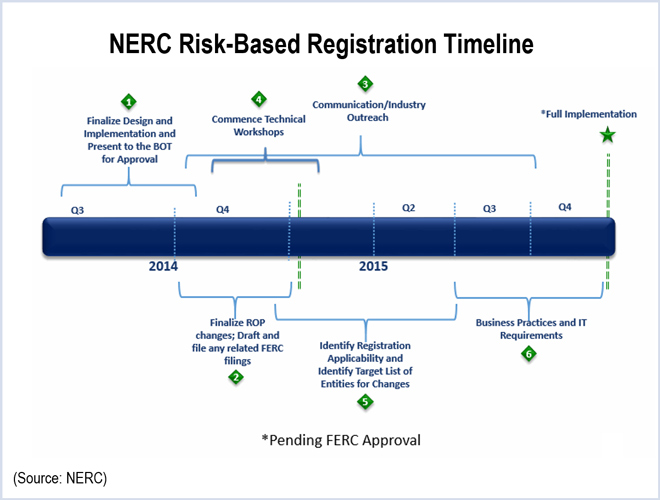By Rich Heidorn Jr.

The Federal Energy Regulatory Commission last week approved NERC’s Risk-Based Registration (RBR) initiative, with a few modifications and caveats (RR15-4).
The order approves NERC’s proposals to:
- Remove purchasing-selling entities and interchange authorities as functional registration categories. Because these entities’ activities are commercial in nature, their removal poses little or no risk to reliability, NERC said. FERC rejected a proposal to also remove load-serving entities from registration, ordering NERC to provide more information to ensure that there are no reliability gaps.
- Raise the threshold for registering entities as distribution providers to those with loads of 75 MW or more, up from 25 MW. NERC also will provide a subset list of reliability standards to distribution providers that are subject to NERC rules solely due to their operation of underfrequency load shedding protection systems. The change is expected to affect about 100 entities, representing less than 1% of load served by NERC-registered distribution providers.
- Align five functional registration categories with the 2012 revised definition of the bulk electric system.
- Make procedural changes to its registration process, including the introduction of a “materiality” test for registration.
NERC’s Compliance Registry currently lists more than 1,600 organizations responsible for about 4,300 reliability functions under 15 functional entity categories.
The commission said the changes would allow regulators to focus resources on entities with the greatest potential impact on reliability.
NERC said the changes will reduce regulation of about 700 organizations, with about 200 exempt from all NERC rules, and another 500 removed from some registrations while remaining regulated under others. For example, interchange authorities, which verify and communicate interchange schedules, are also registered as either a balancing authority or reliability coordinator.
FERC Chairman Cheryl LaFleur called the changes “another significant step in the evolution” of the mandatory reliability standards ordered by the Energy Policy Act of 2005.
In February, FERC approved NERC’s risk-based approach to reliability compliance monitoring and enforcement, which will reduce the kinds of reliability violations subject to NERC enforcement, with “minimal”-level risk issues subject to less oversight (RR15-2). (See New NERC Enforcement Methods Allow Self-Logging Minor Risk Issues.)
Commissioner Norman Bay said that it is “incumbent on NERC to show that reliability is in fact being enhanced” as a result of the changes.



